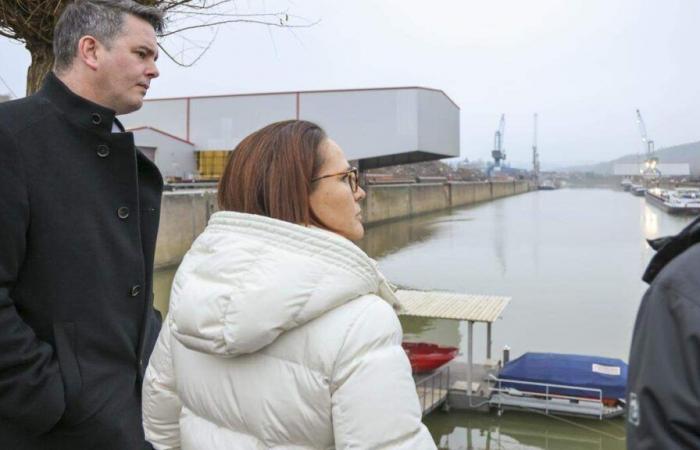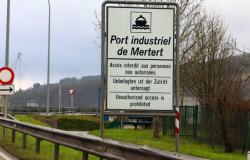Chaos on the Moselle. On December 8, a boat damaged the Müden lock to the point of paralyzing navigation on the Moselle. In total, more than 70 boats must be released. The first rescue attempts have been taking place since Monday with the help of a crane, divers and a lot of patience. In the first 24 hours, eight emergency lockages were carried out, said Tobias Schmidt from the Waterways and Shipping Office (WSA) Moselle-Saar-Lahn. “Everything is going very well,” he added.
Nevertheless, the lock accident has significant consequences, including as far as Luxembourg. The port of Mertert is also feeling the effects of the accident. On Tuesday, Minister of Mobility Yuriko Backes and Minister of Economy Lex Delles visited the Luxport to speak with port operators and hear their main concerns after the incident. The ministers reaffirmed their desire to do everything possible to minimize the economic consequences of this interruption of navigation and to preserve the competitiveness of Luxembourg companies.
“Maintain the supply chain”
“The Moselle is one of the busiest rivers in Europe,” said Yuriko Backes. “Since December 8, we have been trying to find solutions with all the stakeholders.” One of these solutions is to reorient transport towards road and rail. In this situation, transport by truck must be exceptionally possible during public holidays and Sundays. Yuriko Backes stressed that the government’s “priority is to keep the supply chain functioning.”
In addition, the minister was satisfied that the emergency lockages were being carried out more quickly than initially planned. Backes is in contact with the German Transport Minister: “Discussions and cooperation are going well.”
We need alternatives so that we don’t find ourselves in a situation like this in the future.
Yuriko Backes
Minister of Mobility and Public Works
Two rooms at the locks
The problem of locks has existed for a long time. This is why the Minister of Mobility wants to discuss with her German counterpart the introduction of two new chambers at the locks (the central space where the boat enters and waits while the water level is adjusted, Editor’s note). “This of course has a cost, but we now see what the consequences of such an accident are. We need alternatives to avoid finding ourselves in such a situation in the future,” the minister said. “We also want to apply for European funds in order to be better positioned in the future.”
Currently, it is not possible to quantify the amount of the damage suffered. Only the future will tell us. “We hope that the lock will be repaired by the end of March,” said Yuriko Backes.
Economy Minister Lex Delles said: “We have to find solutions.” Shortly after the accident, the ministry sought to contact the companies involved. The repercussions are mainly felt by the port itself as well as by the companies that deal with the further processing of the goods. Lex Delles stressed that the port’s fuel reserves were full.
As scrap metal is one of the main products handled by the port, these companies are also affected, but “this does not seem dramatic at the moment,” explained the minister.
We are currently in contact with three companies for partial unemployment.
Lex Delles
Minister of the Economy, SMEs, Energy and Tourism
Companies that process sand are also affected. This is delivered to the port of Mertert and is particularly important for construction companies that need it for cement production. Due to the lock accident, sand no longer arrives by boat at the Port of Mertert, but “there are other possibilities for transporting sand to Luxembourg, so they obviously cost more,” said Lex Delles. The ministers were unable to say which Luxembourg companies were specifically concerned.
The economic committee is currently in contact with three companies which have submitted a request for partial unemployment. The minister declared in this regard: “Through the economic committee, the companies concerned can in particular resort to partial unemployment due to force majeure, which proves to be an instrument well suited to dealing with exceptional situations such as those that we currently know.
Keep volumes rising
Generally speaking, the port is happy to be trimodal, that is to say being able to use road and rail in addition to transport by water. This was underlined by the port director, Gilles Braquet: “We see how important the Moselle is for Luxembourg. It’s a good thing that we have several transport routes. The goal now is to keep the volume at a higher level, he added.
700,000 tonnes of goods are processed at the Port of Mertert each year. About 60% are steel products and scrap metal, as Braquet clarified during a port visit in June. The work is carried out by 120 employees in the port and 182 in the transport sector, including 120 drivers.
With a turnover of 69.7 million euros, Luxport achieved a net profit of around one million euros in 2023. 11.8 million euros of turnover came from transport by boat and 41.5 million from transport by truck. Luxport includes, among others, the road transport company Lorang, which has 120 tractors, and Thesilux, which is responsible for paving work, for example steel beams or sheet piles.
This article was originally published on the Luxemburger Wort website.
Adaptation: Simon Martin






